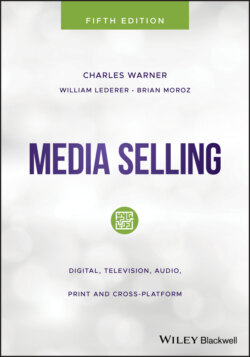Читать книгу Media Selling - Warner Charles Dudley - Страница 91
Sales Ethics in the Advertising‐Supported Media
ОглавлениеA ballad made famous in the late 1930s by Jack Teagarden, titled “A Hundred Years Today,” has been used by countless young men to woo their dates and to convince them not to wait to give out their kisses (and more), because who would ever know what they had done in a hundred years. It was a pitch for a one‐night stand, not a long‐term relationship. It was probably an effective short‐term tactic because two people were not going to live another hundred years and were more than likely able to keep their actions secret if they wanted to.
However, clever short‐term tactics are unwise for corporations for three reasons: (1) corporations, by charter, are immortal – they last forever – and, therefore, they want to do business a hundred years from today, (2) corporations have multiple relationships with customers and suppliers thus making it highly unlikely that they can keep details of these relationships secret for very long, and (3) in the age of transparency4 created by the Internet, “…Information is like a toddler: It goes everywhere, gets into everything, and you can’t always control it.”5 These reasons are especially important for large public corporations that file detailed reports with the Securities and Exchange Commission. Some of these reports contain information on contracts with key strategic partners and are available to the public from https://www.sec.gov/edgar/searchedgar/webusers.htm – an example of transparency.
These three factors are magnified several times with media companies because their revenue depends on maintaining the long‐term trust of their advertisers, subscribers, and audiences. Major advertisers provide the lion’s share of revenue for most media businesses. Furthermore, major advertisers such as Proctor & Gamble (P&G), General Motors (GM), and AT&T not only have long memories, but they will also be around in a hundred years. As Warren Buffett, known as the country’s most astute investor, has said, “Trust is like the air we breathe. When it’s present, nobody really notices. But when it’s absent, everybody notices.”6 It is not smart business to undo a trusting relationship and bite the hand that will feed your company in future years. If media salespeople lie, cheat, gouge, or overpromise and underdeliver in order to make their short‐term numbers, they jeopardize revenue far into the future. Simply put, advertisers do not buy from someone they do not trust – they are not looking for one‐night stands; they prefer long‐term partnerships.
There is also a good chance that if you deceive any of these large customers, they will tell others, especially your competitors and the press. The press loves stories about corporate bullies, liars, and cheaters, and as Dov Seidman writes in his book How, “Corporate scandals, celebrity breakups, political corruption: Each day’s news – delivered instantly via television, radio, website, cell phone … exposes the transgressions of the icons of the day…once we’ve gotten a taste of scandal we can’t seem to get enough.”7 The public has become scandal addicted.
It seems that many corporations, politicians, and people today either do not know about or care about rules, norms, standards, or ethics. Perhaps they go along with unethical behavior because of group pressure or peer pressure or perhaps they rationalize to themselves “everyone does it,” “it’s standard practice in this business (or political campaign),” or “no one will know; I won’t get caught.” Maybe they think, “My manager said to do what it takes to make the quarter,” or “If I don’t take their money, someone else will.” Such callous rationalization of lying, cheating, and stealing is typical sociopathic or malignant narcissistic behavior.
Within the last several years, I know of a salesperson for a major media company who forged a client’s signature on a contract. The salesperson was certain the customer would eventually sign the contract, and the salesperson wanted to start the campaign early in order to meet his quarterly quota and, thus, make more money. When the advertiser got the first invoice, the surprised reply was, “What’s this, we never bought anything or signed anything?” Why did the salesperson forge a signature? Was there pressure from management to close business early or did greediness motivate the salesperson? What was the root cause of this unethical behavior? Of course, being a sociopath or a narcissist clearly can lead to unethical behavior, but people not suffering from these personality disorders sometimes behave unethically. Why?
